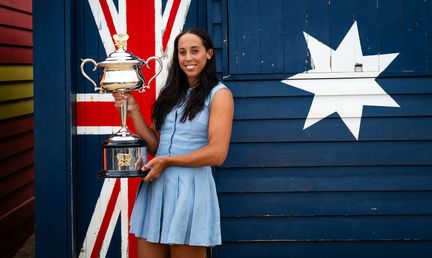CHARLESTON, SC, USA - After an expectation-filled start of the season, World No.10 Aryna Sabalenka says she comes into the clay season with no pressure. The 20-year-old Belarusian kicked off her clay season with a comeback win over Kateryna Kozlova in the first round of the Volvo Car Open, rallying from a set and a break down to win 3-6, 6-3, 6-3.
A year ago, Sabalenka was ranked No.60 and back in Europe preparing for the International event in Lugano, where she made her first final of what would be a breakout season. Now she is the No.3 seed in Charleston, a Premier event, with a big opportunity to make a rankings push over the next two months. Sabalenka went 4-5 in main draw matches last year on clay.
"I don't really feel pressure on the clay court, because I just really want to improve my game on the clay court, because it's completely different with grass and the hard court," Sabalenka told reporters. "So I'm just trying to improve my game here, so no pressure."
Gone are the days when the clay season was dominated by the grinding athletes that historically made up the best dirtballers. Power can prevail on clay, and Sabalenka is well aware that she has a chance to do some damage.
"I actually feel [I can do well], because I'm moving okay on the clay court, like much better than last year," Sabalenka said.
"I just need to adjust for the long rallies, because on the hard court you can finish the point with two or three balls and on the clay court it's like twice or three times longer. I just need to keep in my mind that you need to stay in the rally, so I don't need to rush on the clay court."
Much was expected of Sabalenka after her astounding finish to 2018, which saw her kick things off with a final on the grass of Eastbourne, before making the Cincinnati semifinals, winning New Haven and Wuhan, making her first Round of 16 at a Slam at the US Open, and going 8-2 against Top 10 opponents over that span.
Sabalenka began 2019 with a title run at the Shenzhen Open but has gone 0-3 against the Top 20 through the first three months of the season. She brought a 14-6 record into Charleston, but it was her two tough losses in Dubai and Indian Wells that left a mark.
In February, Sabalenka let six match points come and go in a crushing 6-4, 2-6, 7-6(7) loss in the Round of 16 at the Dubai Duty Free Tennis Championships. At the BNP Paribas Open a few weeks later, she failed to close out eventual finalist Angelique Kerber, squandering a 4-1 double-break lead in the third set to lose 6-1, 4-6, 6-4, again in the Round of 16.
"The super bad reaction is after I lost to Bencic, because I had six match points," Sabalenka said. "It was really hard. I cried like crazy after the match.
"But you can’t change anything. You have to learn the lesson.
"You don’t need to rush, you don’t need to try and kill the ball from the first point. Just stay in the rally and just try your best. Don’t rush, because the pressure is on your opponent, not yourself.
"I thought I learned it, but after Kerber, something to learn again."
Her match against Kerber was memorable for a number of reasons. In addition to its dramatic end, Sabalenka and her coach Dmitry Tursunov endured an unexpected on-court coaching exchange, one that surprisingly actually helped her build her lead in the third set. After calling Tursunov down to the court, they sat in almost complete silence before the Russian left the court to return to the box.
"We had a little fight before the match," Sabalenka explained. "He was trying to explain what to do, but it was straight before the match. I said I can’t remember all this stuff. I’m already ready for the match, we talked yesterday. If you’re trying to tell me more stuff, it’s all destroying me. He was upset with me.
"When I called him during the match, he said you know everything, what am I supposed to do. I said can you support me? And he was [silent, shrugging]. It was a tough situation.
"He needs to improve also," she said, laughing.
"Of course it was a lot of expectation from everybody and from me. Of course [the hardcourt season] could be better, but I think step by step I’m improving myself and trying to be better with every tournament, every match, every single day."
On multiple levels, Sabalenka is still a raw talent, one who is only just now understanding what she's capable of and what she can expect herself to achieve. Sabalenka credits her work with a psychologist over the last two years for her improved positivity on the court.
"It's really helped me a lot, because two or three years ago I was like really crazy," she said. "Like, if you look back, try to find some matches, ITF tournaments, you'll see the big difference.
"Right now I am still crazy. I'm still getting pissed, like, really easily, but it's better. Still need to improve."
Improvement is the watchword in the Sabalenka camp. After spending nearly two hours on court to get her opening win in Charleston, Sabalenka was back on the practice court immediately to practice her serve. There was no time to rest after hitting 11 double-faults in the match.
Sabalenka's hunger and lack of complacency should make her a dark-horse to power through the clay season.
"Yeah, just to be honest, [you have] more time on the clay court, so you can prepare for the shot much better and adjust for the ball really good, to make sure that you can hit whatever you want. It's just all about the long rallies. It's slower, so it's not three shots, it's six shots.
"But I mean look at Kiki Bertens, she's an aggressive player, but she really does well here. So we need to learn from her how to play really well here."







